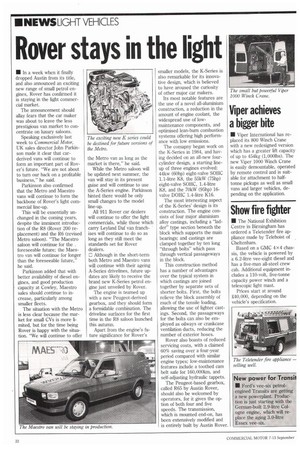Rover stays in the light
Page 24

If you've noticed an error in this article please click here to report it so we can fix it.
• In a week when it finally dropped Austin from its title, and also announced an exciting new range of small petrol engines, Rover has confirmed it is staying in the light commercial market.
The announcement should allay fears that the car maker was about to leave the less prestigious van market to concentrate on luxury saloons.
Speaking exclusively last week to Commercial Motor, UK sales director John Parkinson made it clear that carderived vans will continue to form an important part of Rover's future. "We are not about to turn our back on a profitable business," he said.
Parkinson also confirmed that the Metro and Maestro vans will continue to form the backbone of Rover's light commercial line-up.
This will be essentially unchanged in the coming years, despite the imminent introduction of the R8 (Rover 200 replacement) and the R6 (revised Metro saloon). "The Maestro saloon will continue for the . foreseeable future; the Maestro van will continue for longer than the foreseeable future," he said.
Parkinson added that with better availability of diesel engines, and good production capacity at Cowley, Maestro sales should continue to increase, particularly among smaller fleets.
The situation with the Metro is less clear because the market for small CVs is more limited, but for the time being Rover is happy with the situation. "We will continue to offer the Metro van as long as the market is there," he said.
While the Metro saloon will be updated next summer, the van will stay in its present guise and will continue to use the A-Series engine. Parkinson hinted there would be only small changes to the model line-up.
All 911 Rover car dealers will continue to offer the light commercials, while those which carry Leyland Daf van franchises will continue to do so as long as they still meet the standards set for Rover dealers.
C Although in the short-term both Metro and Maestro vans will continue with their ageing A-Series drivelines, future updates are likely to receive the brand new K-Series petrol engine just unveiled by Rover.
The engine is teamed up with a new Peugeot-derived gearbox, and they should form a formidable combination. The driveline surfaces for the first time in the R8 saloon launched this autumn.
Apart from the engine's future significance for Rover's smaller models, the K-Series is also remarkable for its innovative design, which is believed to have aroused the curiosity of other major car makers.
Its most notable features are the use of a novel all-aluminium construction, a reduction in the amount of engine coolant, the widespread use of lowmaintenance components, and optimised lean-burn combustion systems offering high performance with low emissions.
The comapny began work on the K-Series in 1984, and having decided on an all-new fourcylinder design, a starting lineup of three engines evolved: 44kw (60hp) eight-valve SOHC 1.1-litre K8, the 55kW (75hp) eight-valve SOHC, 1.4-litre K8, and the 70kW (95hp) 16valve DOHC 1.4-litre K16.
The most interesting aspect of the K-Series' design is its construction. The engine consists of four major aluminium alloy castings, including a "ladder" type section beneath the block which supports the main bearings; and castings are clamped together by ten long "through bolts" which pass through vertical passageways in the block.
This construction method has a number of advantages over the typical system in which castings are joined together by separate sets of shorter bolts. First, the bolts relieve the block assembly of much of the tensile loading, allowing the use of lighter castings. Second, the passageways for the bolts can also be employed as oilways or crankcase ventilation ducts, reducing the number of exterior hoses.
Rover also boasts of reduced servicing costs, with a claimed 6070 saving over a four-year period compared with similar engine types; low-maintenance features include a toothed cam belt safe for 160,000km, and self-adjusting hydraulic tappets.
The Peugeot-based gearbox, called R65 by Austin Rover, should also be welcomed by operators, for it gives the option of both four and five speeds. The transmission, which is mounted end-on, has been extensively modified and is entirely built by Austin Rover.




















































































































